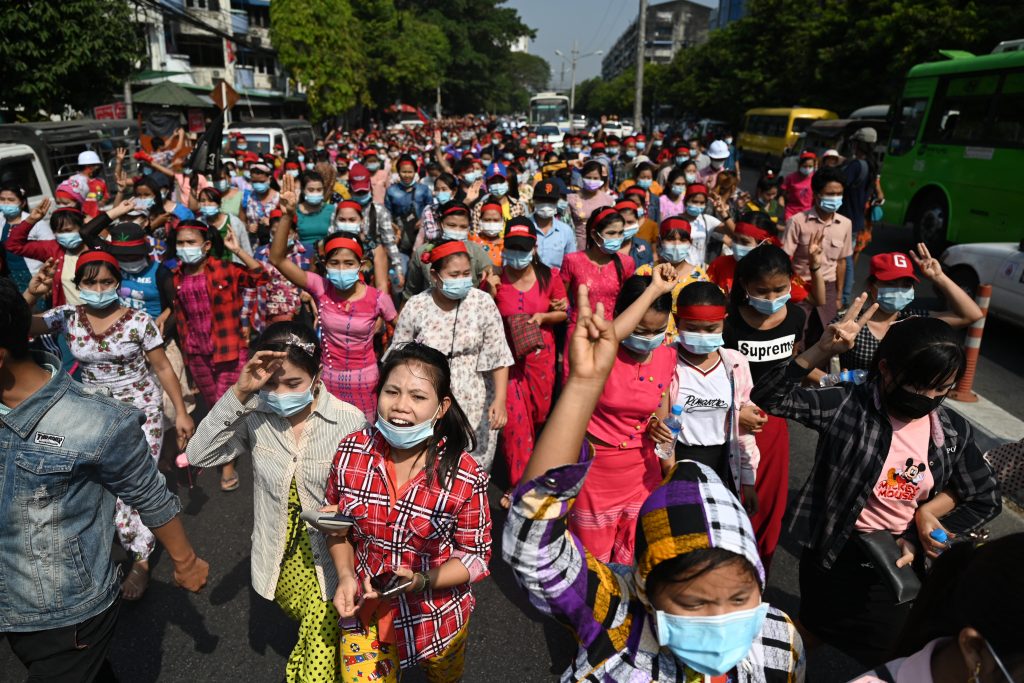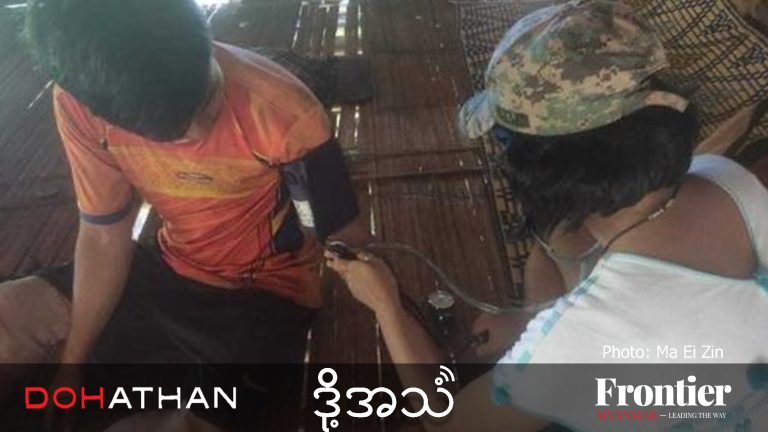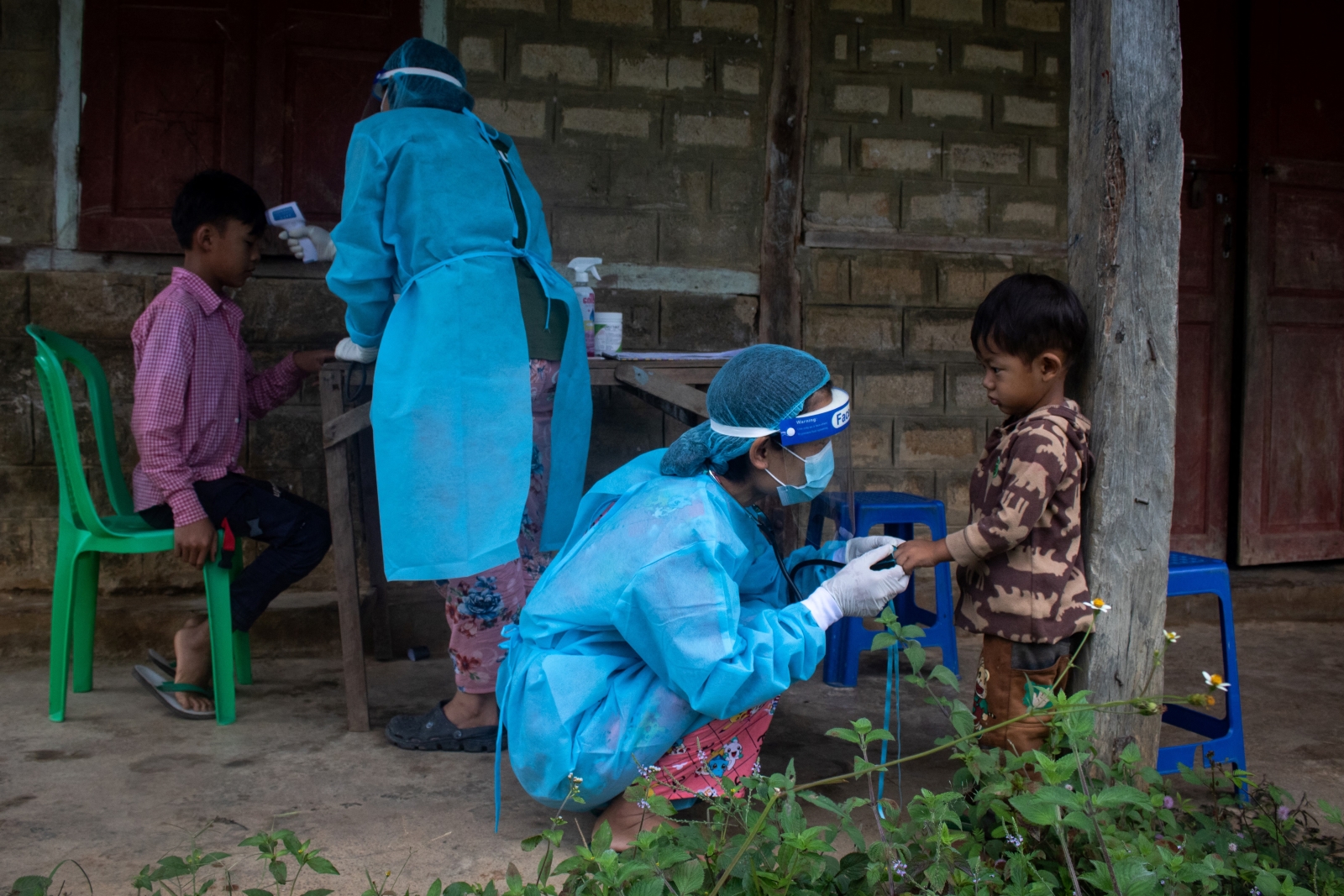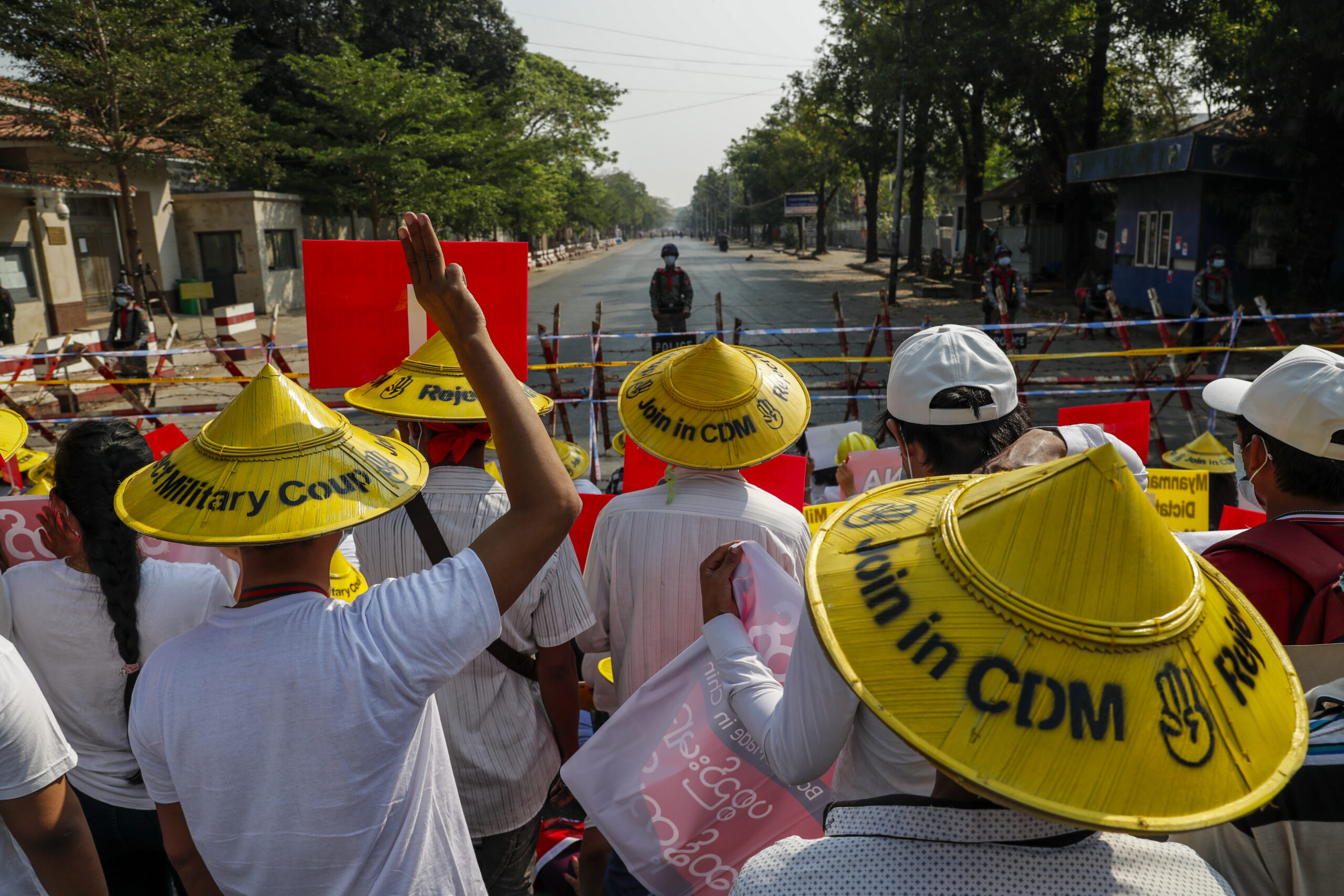Unscrupulous factory owners have used the coup to cut wages and harass workplace unions, but successful strikes at two plants late last year have highlighted the determination of workers to resist exploitation and abuse.
By KO MAUNG and STEPHEN CAMPBELL | FRONTIER
When the Myanmar military seized power on February 1, 2021, factory workers in the industrial zones around Yangon were immediately apprehensive.
“It’ll be like it was before,” said Ma Phyu*, a worker interviewed by the authors two days after the coup, referring to the decades under military rule before 2011 when labour unions were de facto illegal. “Employers will oppress workers and reduce their wages,” she said.
Concern about the possibility of deteriorating working conditions and restrictions on employees organising at their workplaces were major reasons why thousands of mostly young, mostly female factory workers protested against the coup in downtown Yangon on February 6, catalysing a series of general strikes that have taken place since the coup.
Alongside the protests, civil servants, led by doctors, nurses and other healthcare workers, had launched a Civil Disobedience Movement that would subsequently attract hundreds of thousands of other public and private sector workers.
At Yangon’s ports, striking truck drivers brought international trade to a standstill and the banking system was paralysed by walk-outs. Workers making military equipment at Ministry of Defence factories and miners employed at Chinese-run copper mines with revenue-sharing agreements with the military also joined the general strike.
By organising themselves and taking direct action, workers throughout Myanmar made history in the weeks and months after the coup. As a student activist involved in the protests acknowledged in June 2021, “Working-class people have been crucial to our movement.”
The experiences of workers in industrial zones around Yangon since the coup make clear the causal link between military rule and the humanitarian crisis unfolding in Myanmar and show how the collective struggles of workers to improve their livelihoods is a critical element of the broader popular uprising.
At the same time, the employment-related demands made by workers in industrial zones around Yangon since February 1 last year – for better wages and working conditions and increased opportunities to organise – reveal a continuity between working-class struggles since the coup and those during the so-called democratic transition.
The enduring collective struggles of workers in industrial zones around Yangon – and those of ordinary people throughout the country – reflect the need for something beyond mere restoration of the pre-coup political arrangement.
What is apparent in these workplace movements is a process of democratisation from below, as workers endeavour to assert collective power in their workplace.
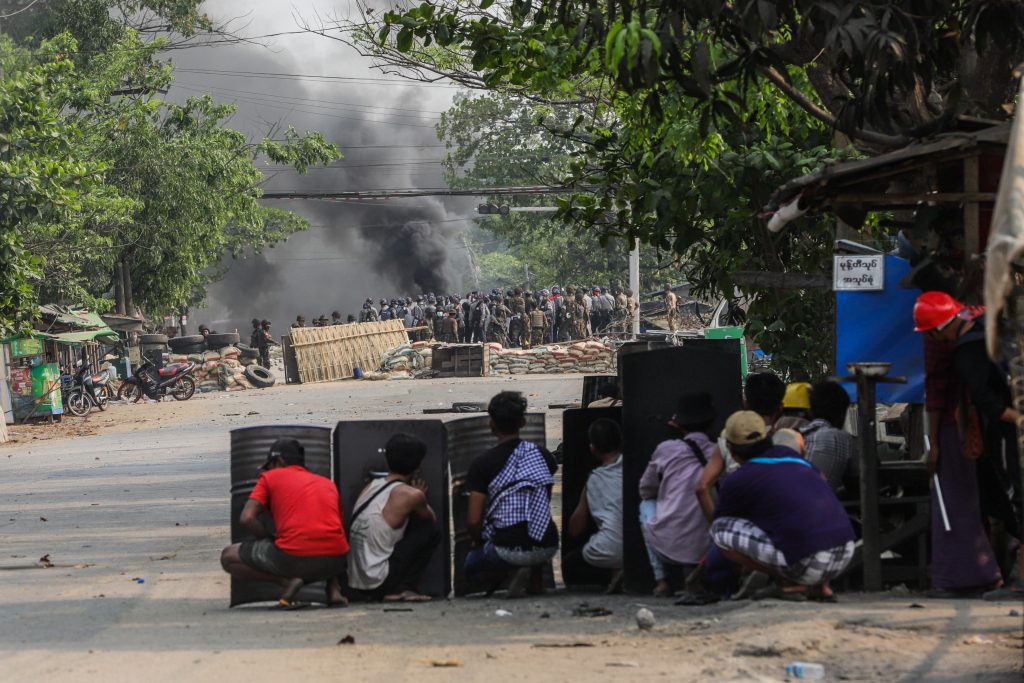
Repressing workers, enabling exploitation
The junta’s response to defiant factory workers has been brutal. On February 26, 2021, the junta declared 16 of the country’s most prominent trade unions and labour organisations illegal and threatened to arrest labour activists who continued to organise anti-coup activities, signalling an acute awareness of the power of labour organising.
On March 14, soldiers and police killed at least 65 protesters in Yangon’s heavily industrialised Hlaing Tharyar Township, where tens of thousands of factory workers live. Later that day, martial law was declared in Hlaing Tharyar and nearby Shwepyithar Township. On March 15, martial law was also declared in the Yangon townships of North Dagon, South Dagon, Dagon Seikkan and North Okkalapa, all of which suggests the junta was targeting working class neighbourhoods.
On April 15, about 40 soldiers raided the Shwepyithar office of the Solidarity Trade Union of Myanmar and arrested its director, Daw Myo Myo Aye, for organising anti-coup activities. Other union leaders and labour activists have since gone underground or fled abroad.
In the weeks after the coup, workers’ strikes, supply chain disruptions and a climate of insecurity compelled factories in Yangon’s industrial zones to suspend operations. Following the mass killings of protesters at Hlaing Tharyar on March 14 and the subsequent imposition of martial law, many workers fled the industrial zones for their hometowns in rural Myanmar. By July, an estimated 250,000 jobs had been lost in garment factories alone, said the International Labour Organization.
Since then, most factories around Yangon have reopened and workers who fled post-coup violence and economic disruption have returned, despite military and police harassment. Although many workers wanted to support the CDM, they have been forced to return to work because of limited livelihood options and lack of social support due to junta restrictions.
As workers returned to factory jobs, many employers took advantage of martial law and economic disruption to cut their wages, degrade working conditions and undermine workplace labour groups.
Ko Aung*, a factory worker interviewed in January, said casualisation was increasingly common. “They use politics as an excuse to undermine the workers’ organisation. During this time of political instability, there aren’t many workers on monthly salaries. They hire daily labourers. If you’re dissatisfied, they fire you,” he said. “There are no written contracts for daily labourers. For the daily wage, they pay K3,600 (about US$2).”
Employers have also leveraged the junta security apparatus against workers who try to collectively organise for wage increases and improved working conditions.
On March 16 last year, police and soldiers called by the owner of the Xing Jia factory in Hlaing Tharyar reportedly shot and killed six workers who had argued over their wages with their employer, whom they accused of theft.
“After the coup, the workers’ situation deteriorated,” said Ko Aung. “Employers took advantage of the political situation to severely oppress the workers.”
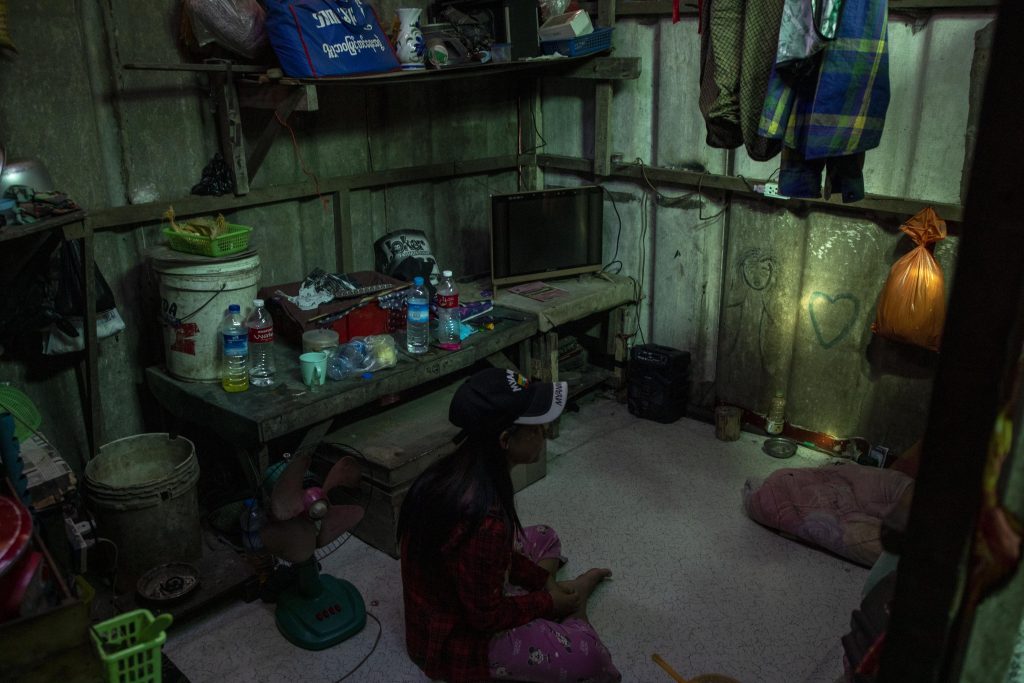
Harassment and extortion
In the industrial zones of townships under martial law, workers are also facing constant harassment from patrolling soldiers and police, who act with impunity and often extort money from employees travelling outside their workplaces.
“When I’m travelling along the road, I don’t feel secure,” said Ma Khaing*, another worker interviewed in January.
“They [police] check our phones” for anti-coup content, she said. “When I’m travelling along the road, I can never be sure whether I’ll be stopped and questioned. I worry about that.”
“We’ve been told that we can be imprisoned for three years if we have [anti-coup] news on our phone. When I’m planning to go out, I always delete everything from my phone in advance. Only then do I go out,” Ma Khaing added, “If they find [incriminating content] on our phone, they accuse us of supporting the PDF [People’s Defence Forces] and demand money. They demand as much as they want. A person must give the money as demanded. If they don’t pay, [the police] say they’ll send the worker to be interrogated.”
Wary of having their brands tarnished by association with violent military rule, some international apparel companies have stopped sourcing garments from Myanmar. Others, such as H&M and Zara, initially suspended orders after the coup, but have since resumed placing orders with suppliers. As of October 2021, most of Myanmar’s 600 or so garment factories that produce for export are operating, though with reduced workforces, according to the Myanmar Garment Manufacturers’ Association’s October newsletter.
The reduced demand for labour has left workers even more vulnerable to exploitation. They often have to accept lower wages and poorer working conditions or face the threat of dismissal, while union organisers are particularly at risk of being sacked. Many people desperate for work are paying brokers to arrange jobs for them in neighbouring Thailand, where thousands have been arrested for entering the country illegally.
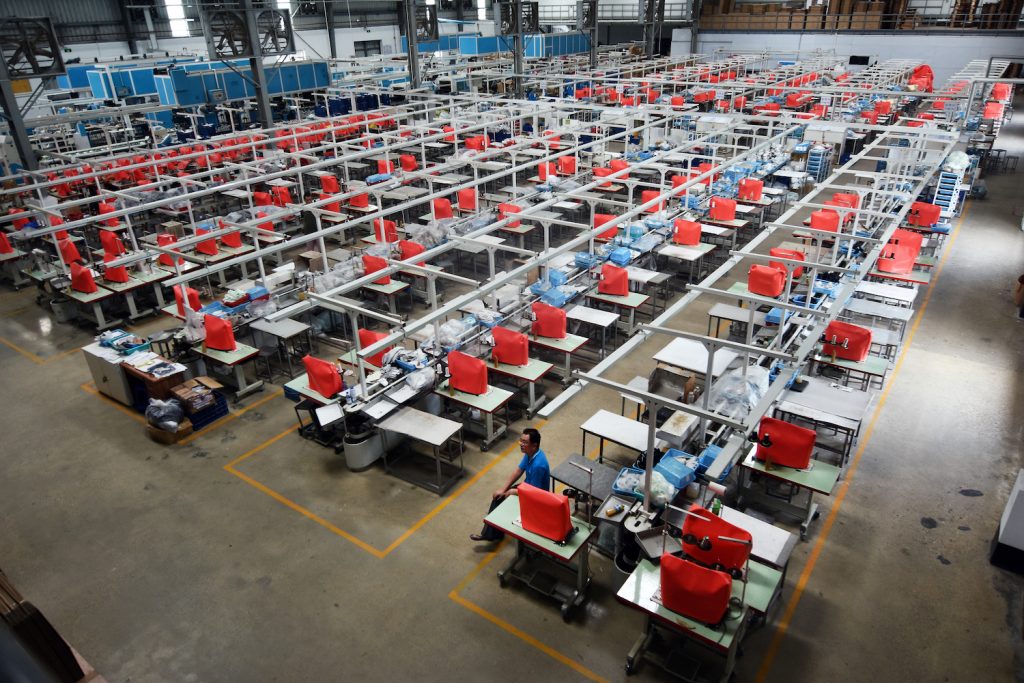
Workers’ struggles under military rule
For factory workers and their families, the coup has exacerbated what were already extremely precarious conditions in the industrial zones around Yangon.
In February 2020, at the start of the COVID-19 pandemic, disruptions to the supply of raw materials from China led to garment factory closures and the loss of between 10,000 and 15,000 jobs. By September 2020, 233 factories had requested permission from the authorities to close, suspend operations or lay off workers. Employers then used the pretext of COVID-19 disruption to sack unionised workers, while police intervened to break up strikes and arrest organisers.
With no effective social safety net even before the coup, factory workers sacked during the pandemic often had little choice but to take on further debt and reduce food consumption, and in some cases turned to sex work to support their families.
But working class communities in the industrial zones around Yangon were already struggling before the pandemic. Labour law violations and wages below the legal minimum were prevalent at factories in Yangon. Many other workers toiled in informal arrangements outside the remit of labour protection laws.
Nevertheless, even while the decade before the coup was difficult for workers, there was genuine progress being made and hope that positive changes would continue.
Trade unions had been banned for nearly 50 years, but were permitted again under the Labour Organisation Law enacted in 2011 under the pro-military Union Solidarity and Development Party government. The law resulted in hundreds of thousands of factory workers in Yangon and elsewhere organising themselves into unions; by 2021, almost 3,000 workplace unions had been registered throughout the country.
Over the ensuing decade, many of these unions went on strike for better wages and working conditions. Some of the most assertive factory-based unions were affiliated with the Federation of Garment Workers of Myanmar and the All Burma Federation of Trade Unions. These unions, and the broader working class networks of which they are a part, have formed a dedicated constituency of resistance to military rule since the coup.
As well as street protests, workers have also been organising since the coup to collectively push for better wages and working conditions. Such moves can involve extremely high risk, as shown by the killing of workers at the Xing Jia factory in March 2021.
However, there have been two notable cases since the coup of workers in Yangon’s industrial zones making tangible gains by going on strike.
On October 14 last year, about 350 workers at the Gasan Apparel factory in Hlaing Tharyar went on strike over pay cuts and reductions in benefits. The strike continued into early November, when soldiers and police raided the factory and the strikers were forced to flee.
Workers say senior management called in junta forces to put down the strike. Management also told the workers that the factory would close in December because of a lack of orders. However, a worker interviewed in January for this article said the threat to shutter the factory – which remains open – was a ploy by the owner to sack unionised workers and avoid paying them severance.
“The workers had the right to receive severance pay and demanded to receive it but management refused,” said the worker, who asked not to be identified. “Soldiers came, but the workers had solidarity and continued to demand severance pay and the employer eventually agreed to pay. You can say that we were victorious.”
Then on December 8, about 800 workers at a factory in Shwepyithar Township, which they asked not be identified, began a strike that lasted 11 days and also ended in a victory for workplace solidarity.
The workers’ demands were for the employer to stop cutting the bonuses of employees who were unable to work every day, serve better quality rice in the factory canteen, and sack a human resources manager accused of constant harassment. The workers achieved their demands, including the removal of the human resources manager. They also held a workplace election to choose a new executive committee for their factory-level union.
These stoppages have demonstrated that factory workers in industrial zones around Yangon have the motivation and capacity to organise and strike for collective demands, despite the restrictions and risk of violence they face under martial law. The strikes are therefore an important precedent for further workplace action under post-coup conditions.
* denotes the use of a pseudonym


